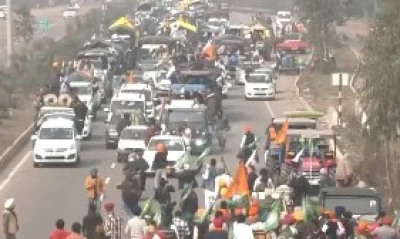Farmers hailing from numerous States near
the ambit of the national capital have begun their ‘Chalo Delhi’ march as they
present their set of demands for the Central Government’s consideration. As
their protest gained momentum, it caused chaos at Punjab-Haryana (Shambhu)
border after protesting farmers began taking away the barricades, following
which the Haryana Police fired rounds of tear gas to disperse the crowd.
Leaders representing farmers from
Punjab, Haryana, and Uttar Pradesh engaged in a constructive talk with Union Ministers
during a five-hour meeting on the evening of Monday. This marked the government’s
concerted effort to address the impending protest.
During the second round of discussions
on Monday, Union Agriculture Minister Arjun Munda and Food and Consumer Affairs
Minister Piyush Goyal expressed that significant consensus had been achieved on
most issues concerning the farmers. However, despite this development, the
farmers affirmed their decision to proceed with the march on Tuesday, leading
to the closure of many State borders around Delhi.
In a joint announcement, the Samyukta
Kisan Morcha (Non-Political) and the Kisan Mazdoor Morcha disclosed that
farmers will converge on Delhi to advocate for their demands, including the implementation
of a law ensuring a minimum support price (MSP) for crops.
The primary catalyst for the farmers’
protest revolves around securing a legal guarantee for MSP. Additionally, their
demands encompass the enactment of the Swaminathan Commission’s recommendations,
as well as the waiver of farm debts.
Key Highlights of Chalo Delhi March
1. Farmers from Haryana, Punjab, and
Uttar Pradesh are mobilising for a massive protest in New Delhi, appealing the
government to legislate a concrete MSP guarantee. The announcement of the ‘Delhi
Chalo’ march last week underscores their determination to press for the
acceptance of their demands.
2. The farmers have articulated a
comprehensive set of conditions, including a legal guarantee of MSP, provision
of pensions for farmers and farm labourers, debt relief for farmers, and
seeking justice for the victims of the Lakhimpur Kheri violence.
3. Security measures at the Singh,
Tikri, and Ghazipur borders in Delhi have been heightened, with the
installation of cement barricades, metal nails, and barriers aimed at
controlling vehicular movement and averting disturbances in the national
capital.
4. The Delhi Police, taking proactive
measures, imposed Section 144 of the Criminal Procedure Code at the Uttar
Pradesh borders to prevent untoward incidents in anticipation of the farmers’
protests on Tuesday.
5. In anticipation of the demonstration,
over 50,000 security personnel have been deployed at Delhi’s borders.
Furthermore, to maintain public safety, internet and bulk SMS services have
been temporarily suspended in seven districts – Ambala, Kurukshetra, Kaithal,
Jind, Hisar, Fatehabad, and Sirsa – on February 13.

















